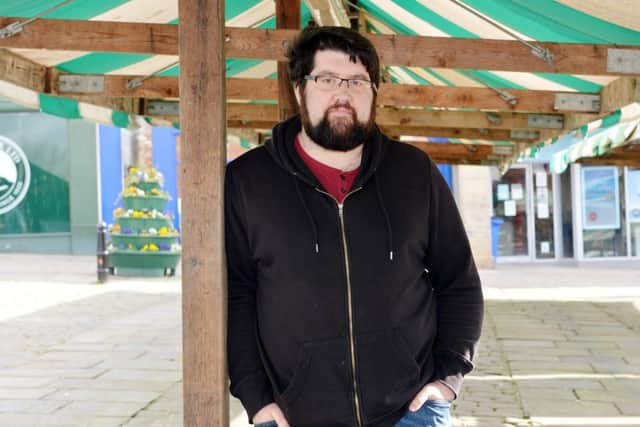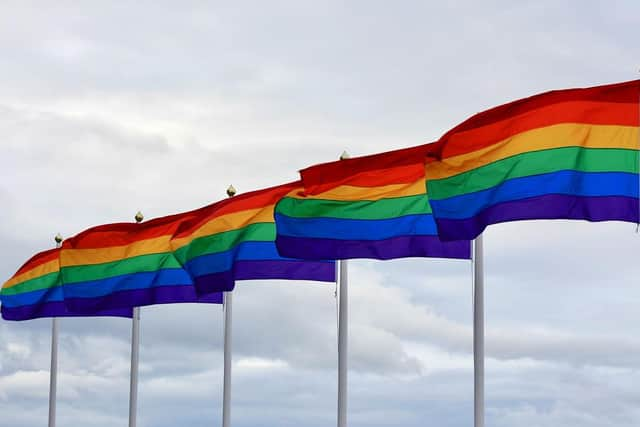Gay man from Chesterfield tells of how he’s haunted by ‘archaic’ law
and live on Freeview channel 276
On May 24, 1988, Section 28 came into effect – banning the ‘promotion of homosexuality’ in schools and by local authorities.
Section 28 remained in place in England until 2003, meaning countless LGBTQ+ young people were left in the dark and unable to access key information to better understand their identities.


Advertisement
Hide AdAdvertisement
Hide AdThe law was brought in under Margaret Thatcher’s Conservative Government a year before Luke Povey was born.
He was 15 when it was finally scrapped – but it is something which will always haunt him.
Luke, a Chesterfield market trader, said: “I was about eight when I knew I was gay – but because it was illegal to talk about it in schools, I genuinely thought there was something wrong with me.
“Because I was so entrenched in the mindset of ‘it’s not normal’, I thought if I started going to church then that would make things better – Jesus made the lame walk and the blind see so surely I could be fixed?


Advertisement
Hide AdAdvertisement
Hide Ad“I was later baptised as a teen and I became quite involved in the local baptist church.
“The youth group went to a Christian festival every May bank holiday weekend which had all the hype you see and hear on those evangelical Christian-type shows – looking back it feels like I was being washed.
“Those at the church and leading the youth group casually slipped into conversation that being gay was a sin.
“At one point I seriously considered taking holy orders – that way there’d be a reason for me not marrying and raising a family like everyone else.
Advertisement
Hide AdAdvertisement
Hide Ad“I had repressed myself for most of my life, the internalised homophobia was debilitating and I grew up hating myself for who I was.
“I remember watching EastEnders with the family when Ben came out in 2011 like it was yesterday – I went out and vomited after watching it, not because it disgusted me but because of the nerves I had just sitting watching it and the reaction he got.
“I’d been close to suicide a couple of times and taken overdoses because I hated and disgusted myself so much.
“I still struggle with my mental health now – not only that but I struggle being a gay man.
Advertisement
Hide AdAdvertisement
Hide Ad“And it all stems from something that was introduced before I was born – Section 28.”
‘Offensive to gay people’
Under the law, teachers were banned from informing children about LGBT+ people and same-sex relationships, meaning homophobia against both pupils and staff grew out of ignorance.
Councils were prohibited from funding books, plays, leaflets, films or other materials showing same-sex relationships, and LGBT+ youth support groups up and down the nation were shuttered.
Ms Thatcher, who was responsible for the first new homophobic law to be introduced in a century, had voiced her opposition to gay rights at the 1987 Conservative Party Conference in Blackpool.
Advertisement
Hide AdAdvertisement
Hide Ad“Children who need to be taught to respect traditional moral values are being taught that they have an inalienable right to be gay,” she said.
“All of those children are being cheated of a sound start in life. Yes, cheated.”
She was emboldened to express her prejudice by a rise in homophobia exacerbated by the AIDS/HIV crisis and its hostile coverage in the right-wing tabloid press.
David Cameron – who voted against the repeal of Section 28 in 2003 – apologised for the law in 2009, shortly before he became Prime Minister.
Advertisement
Hide AdAdvertisement
Hide AdHe condemned it as ‘offensive to gay people’ and admitted that his own record on gay rights was not ‘perfect’.
Paul Whiteman, general secretary of the National Association of Head Teachers (NAHT) union, said Section 28 ‘still casts a shadow on the school environment and that we still have work to do championing LGBT+ rights in schools’.
He added: “NAHT are working to support school leaders to develop and maintain an environment that welcomes diversity, champions equality and encourages staff members to be their own authentic selves.
“That means having zero tolerance of homophobic, biphobic and transphobic bullying, towards staff or pupils.
Advertisement
Hide AdAdvertisement
Hide Ad“This is our responsibility and it is the right thing to do.”
Advice on coming out
Luke said he wanted to thank those who ‘fought so hard to have the archaic act scrapped – and those who continue to fight’.
He added it is important to normalise LGBT+ relationships and talk about our differences.
Luke also shared his advice to LGBT+ people who may be worried as coming out.
Advertisement
Hide AdAdvertisement
Hide Ad“I would advise that people come out when they are ready,” he said.
“I came out to a close friend first to make sure I had somewhere safe I could go to if things didn’t go the right way.
“As it happened it was fine and there are great places such as the Derbyshire LGBT+ Centre which are ready to help and can be contacted on 01332 207704.”
He added: “Every single situation is different – and while people say it doesn’t matter now, to the individual who is considering coming out to their friends and family, many are still scared of that reaction.
Advertisement
Hide AdAdvertisement
Hide Ad“And we don’t have to just come out once – for many people, coming out is a regular event.
“We have to come out every time we make a new colleague and friend.”